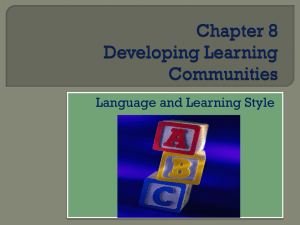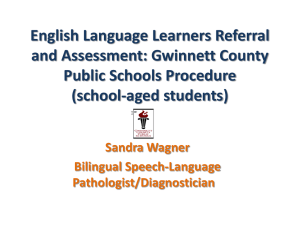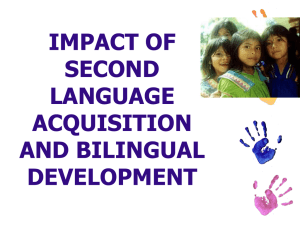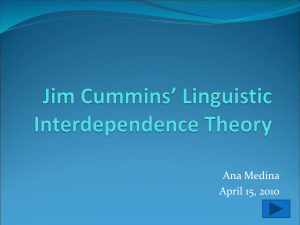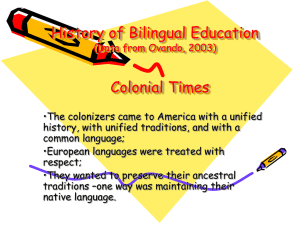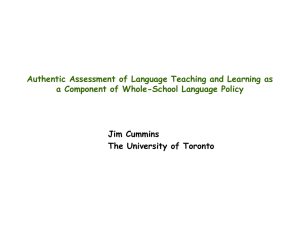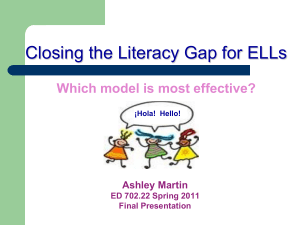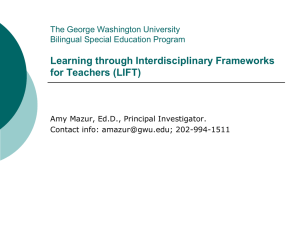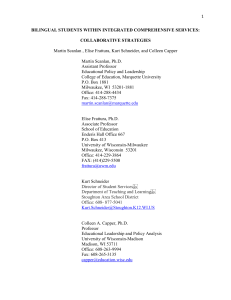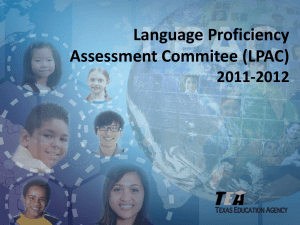Transitional Early Exit PowerPoint
advertisement
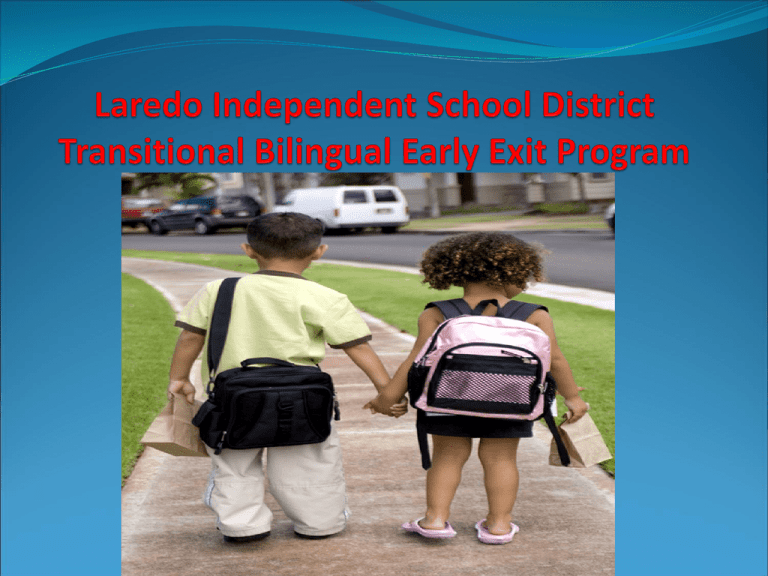
What is the purpose of bilingual education ? The purpose of the Bilingual Education Program is to : Help students with Limited English Proficiency (LEP) master the state curriculum; and Teach English to all participating students. Who does the Bilingual Education Program serve? Bilingual Education Programs serve students who have a language other than English in their homes and need help in learning English. English speaking students may also participate in Bilingual Education Programs to become proficient in two languages. How will the Bilingual Education Program help my child? The Bilingual Education Program: Provides access to the state curriculum; Teaches English to LEP students using appropriate researched-based methods; Helps build knowledge and learning of academic subjects in the first language and English; and Instills self-assurance, confidence and cultural pride in students. Will my child be taught the same subjects and learn the same skills as students in the regular program ? All students in bilingual education must receive instruction in the Texas Knowledge and Skills (TEKS) in their native language and English. Language arts, reading, mathematics, science and social studies are taught as part of the state mandated curriculum. Music, physical education, health and art are also part of a balanced curriculum. Will my child learn English? The mastery of listening, speaking, reading and writing skills in English is required in the program. English as a Second Language (ESL) instruction is an integral part of the Bilingual Education Program. Academic instruction begins in the student’s first language and transitions into English. Who is responsible for teaching in a Bilingual Education Program ? Teachers must be specially trained to teach in a Bilingual Education Programs and meet the special language needs of their students. What is the Laredo Independent School District’s Bilingual Program Model? Transitional Bilingual Early Exit Program Model. Definition The Transitional Bilingual Early Exit Program model is a full-time program of transitional instruction. The amount of instruction in each language (primary and secondary) shall be appropriately designated based on student’s language proficiency and academic potential in both languages. Instruction in the first language is phased out and most students are mainstreamed into English by grade 1 and exited from the Bilingual Program by grade 3. The goal of this model is English proficiency. Program Features The Transitional Bilingual Early Exit Program will follow “Program Features for All Bilingual Programs” as written by the Texas Education Agency (TEA) based on state mandates and State Board of Education rule: 1. Pre-literacy skills and reading will be taught in Spanish for students who are identified as LEP and dominant in Spanish ; 2. Initial concept development for Spanish dominant LEP students will be in the primary language until the student reaches an English proficiency level of 4 or 5 as specified in the Oral Language Proficiency Tests ( Pre- LAS 2000, & LAS Links); 3. Spanish language instruction for the Spanish dominant students will continue as long as the students remain in the Transitional Bilingual Early Exit Program and until criteria is met to transfer them into English. This will be achieved by providing high levels of language development in the primary language and in English as a Second Language. Program Features (continuation) 4.The program maintains strict separation of the language of instruction throughout specified content area blocks; 5. ESL instruction MUST occur daily. English instruction gradually increases as the students’ proficiency in English develops; 6. Daily comprehensible content area instruction in English is taught using concepts and skills drawn from content already taught that in Spanish; 7.Content area instruction and the language of instruction for each content area are noted in the teacher’s lesson plan; 8. Assessment is administered in the primary language and/or the second language as specified by the Language Proficiency Assessment Committee (LPAC); 9. The classroom environment is language and content rich and reflects a bilingual setting. There is evidence of English and Spanish in the following: state adopted instructional materials, instructional bulletin boards, center labels, center materials and equipment, student products, posted classroom and school rules, and written communications to parents; and 10. Strong parental support and involvement are essential to reinforce children’s native and English language development and communicate high expectations about academic achievement. Laredo Independent School District Elementary Transitional Early Exit Model Time Allocations Percentage of Language Instruction BEGINNER INTERMEDIATE ADV. HIGH ADV. 10% 20% 25% 80% 90% 65% 35% 40% 60% 35% 65% 90% 100% 80% 75% 20% 10% Primary Language English *89.1210(b) The amount of instruction in each language within the Bilingual Education Program shall be commensurate with the students' level of proficiency in each language and their level of academic achievement. The students' level of language proficiency and academic achievement shall be designated by the Language Proficiency Assessment Committee (LPAC). The teacher must adjust instruction as students' language profiency progresses in the second language. *The English Language Proficiency Standards ELPS)outline English language proficiency level descriptors and student expectations for LEP/ English Language Learners (ELLs) in Kindergarten-Grade 12. The ELPS are cross-curricular and shall be implemented as an integral part of each subject in the required curriculum. ELPS implementation also increases commensurate to the student's proficiency levels. Questions Children Are Our Future !
